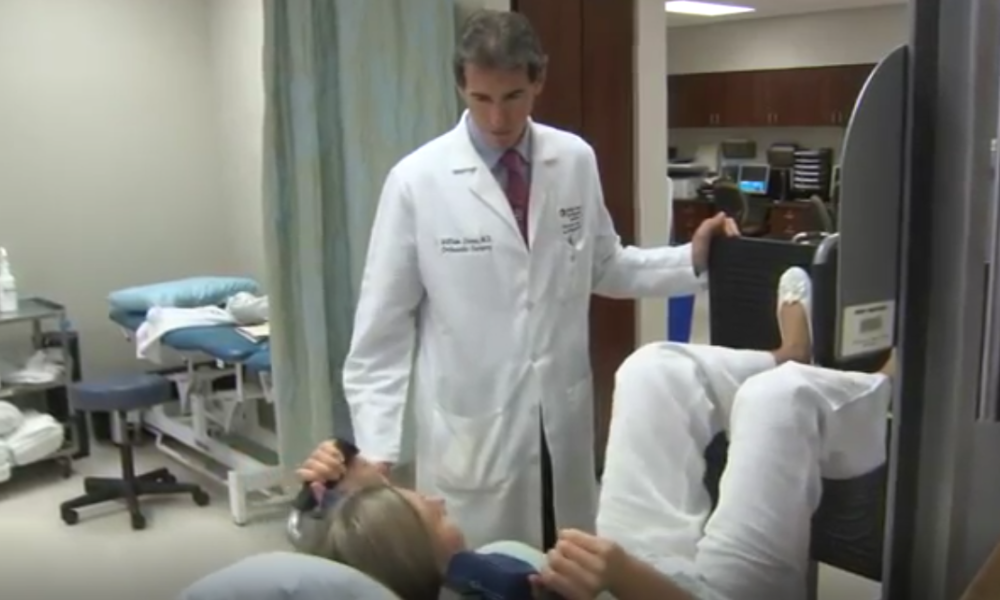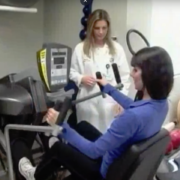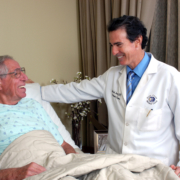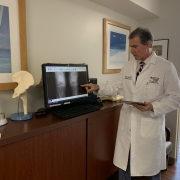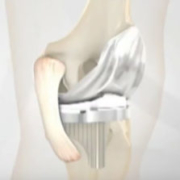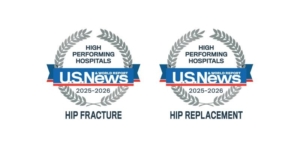How to Minimize Risks Prior to Joint Replacement Surgery
Determining potential risk factors for each patient prior to joint replacement surgery can affect the success of the operation as well as facilitate the best post-surgical outcome.
At The Leone Center for Orthopedic Care, we assess each patient with a consultation, thorough examination and evaluation of all conditions that might pose risks prior to knee or hip replacement surgery.
If you are considering surgery and have any pre-existing health issues or conditions, you should share all information with your doctor to find out what will be done to potentially improve, optimize and manage these conditions pre- and post-operatively. Some of the most common health conditions that can reduce chances for a successful outcome after joint replacement surgery include:
- obesity
- diabetes
- inflammatory arthritis, such as rheumatoid
- past history of venous thromboembolism (a blood clot that forms within a vein)
- past history of pulmonary embolism (blockage in the main artery of the lung)
- physical inactivity
- smoking
- excessive alcohol consumption
- prior injuries or surgeries
Obese patients do face increased risks both during and after joint replacement surgery. The lastest statistics from the Centers for Disease Control estimate that 35 percent of American adults are obese. Obesity puts greater strain on a person’s joints often hastening joint deterioration. At The Leone Center, we counsel potential hip and knee replacement patients to get their weight and diabetes, if they have it, under control. We also are sensitive to many patients feeling like they are in a “Catch 22” situation and, because of the pain from their arthritic joints, cannot be active or exercise.
Rheumatoid and osteoarthritis are two of the main causes of knee and hip degeneraton. According to the American Association of Hip and Knee Surgeons, approximately 43 million Americans suffer arthritis, which is the leading cause of disability in the U.S., affecting some 16 million adults. Both of these conditions are common causes for necessitating a hip or knee replacement. We all are unique individuals with personal needs and tolerances. It’s appropriate to procede with surgery when the disability is servere enough to limit a person’s ability to be active and engaged in life. However, joint replacement surgery should be addressed before someone becomes so disabled that the final outcome is compromised or the surgical risks scale much higher because of joint deformity and destruction or deconditioning. A goal of joint replacement surgery is to eliminate pain and allow a patient to walk pain free. Many of our patients have goals of becoming very active again with all sorts of sports and activities and these too are reasonable goals.
One of the risks with any surgery performed on the hip or knee is the development of a deep venous thrombosis (DVT). This is when a blood clot develops in one of the deep veins and causes a blockage. The area usually is tender, often feels hot and can make the leg swell. A DVT can be uncomfortable. The real danger is the potential for a clot to break off and travel to the lung. This is called a pulmonary emboli.
A pulmonary emboli or (PE) can be fatal. Fortunately, symptomatic DVT is rare. Even more importantly, fatal PE is very rare. If someone has a prior history of DVT or PE then there is an increased risk another could occur. At The Leone Center, we take many precautions to prevent DVT or PE in everyone, including those with a prior history. Some conditions also can increase the risk of both DVT and PE and it is important that these are thoroughly addressed pre-operatively so any increased potential risks can be minimized.
At The Leone Center, we advise our patients to be proactive prior to surgery with a healthy diet and exercise regime that is tailored to each individual, so that each patient is in the best possible physical condition before the procedure. Also, all of our patients are pre-operatively evaluated by their primary physicians to be sure they are optimal candidates for surgery. If a patient does not have a primary physician in the area, we help arrage for him or her to meet one. After surgery, we also make sure that a medical doctor continues to follow each patient’s healing process while in the hospital.
I cannot stress enough that your surgeon’s experience in determining the best course of action for your pre- and post-operative surgery is critical to having the most desired outcome for joint replacement. You want to be assured that your surgeon has anticipated and is prepared for any increased risk factors or situations that may present during your surgery. Many patients will have some type of increased risk factor. The art is to identify and manage these conditions to facilitate a successful outcome.
I have built my reputation by creating both consistently excellent results and personal relationships with my patients. I specialize in joint replacement surgery and have been practicing at Holy Cross Hospital for many years. The Leone Center for Orthopedic Care has helped thousands of people restore quality of life by solving complex problems associated with their hips and knees, using the latest technology and techniques. Part of my success as a surgeon has been to have all of my patients thoroughly evaluated medically before their surgery. This assures that each patient is in the best possible health prior to surgery and helps make their post-surgery rehabilitation faster, more predictable and more satisfactory.
At The Leone Center for Orthopedic Care, the doctor-patient relationship and preparing the patient prior to surgery is as important as the surgery itself.
We thank you for your readership. If you would like a personal consultation, please contact our office at 954-489-4575 or by email at LeoneCenter@Holy-cross.com.

